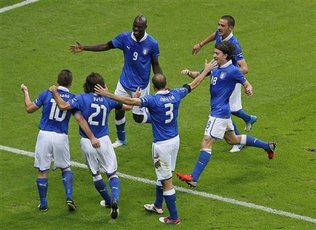
Balotelli challenging minds with his feet
The ignoramus who scrawled “non sei un vero italiano, sei un africano nero” – “You are not a true Italian, you are a black African” – on a wall near the San Siro stadium in Milan. Did he, despite himself, leap off his sofa in delight when Mario Balotelli thumped home his goal for Italy with a powerful nod of his shaven black head and put their country into the final of Europe’s top soccer tournament?
One hopes so.
And the hooligans in Rome who hurled a bunch of bananas into a bar where Balotelli and other young Italy players were relaxing a few summers back, prompting the owner to call the police. Did they, despite themselves, yell with joy as Balotelli celebrated his second goal against Germany in the semifinal, tearing off his blue Italy jersey to proudly show off his black torso of muscles and sinews ridged like thick rope?
Again, one hopes so.
And the idiots – here at the Euros and back in Italy – who have booed and howled like apes at Balotelli because he is black. Did they, despite themselves, feel twinges of shame, and were they moved when his adoptive mother cradled her boy in a long, tight hug after the game of his life, her white hand lovingly stroking the back of his neck and his Mohican-style strip of dyed-blonde hair?
Please, yes, one truly hopes so.
One of the great virtues of sport has always been that it creates heroes who change the way people think or expose those who refuse to. With their exploits, their activism or both, Muhammad Ali, Billie Jean King, amputee sprinter Oscar Pistorius, Aborigine Olympic champion Cathy Freeman and other sports pioneers too numerous to name have rubbed the noses of bigots, sexists, homophobes and the otherwise small-minded in the dirt of their own ugliness, silencing some of them and enlightening others.
Balotelli, with his brilliance on the field and his dignity and good humor off it, is now doing that, too, by shining like no one else at the European Championship that has focused attention on the racism that still blights the continent’s favorite sport, and which climaxes Sunday with the final between Italy and Spain.
The role is not one Balotelli has lobbied for, wholeheartedly embraced or even is naturally suited for. For starters, he’s young, just 21. Before this tournament, where he has impressed with his cool and earnestness, he often made news more for his immaturity than with his play. Notable examples were when he tossed a dart in the direction of another player at Manchester City, his club in England, or when two fire trucks were called last October to his home south of Manchester to douse a blaze he said was caused by friends setting off fireworks in his bathroom.
Before these Euros, France Football magazine asked Balotelli about the thrown bananas in Rome in 2009. His response showed how deeply he’s been hurt by the abuse he’s endured since he first made his mark on soccer at Inter Milan but also perhaps suggested he remains vulnerable to hot-tempered excesses and still has some growing up to do.
“I hope it doesn’t happen again,” he said. “If someone throws bananas at me in the street, I will go to prison because I will kill them.”

Balotelli’s life story is complicated, through no fault of his own. He was born in Sicily, to parents who emigrated there from Ghana. He was gravely ill as a baby, with a malformation of the intestine that required repeated surgeries, and spent months in the hospital.
“I’ve had a lot of luck,” he told France Football of that period of his life. “We are all destructible. But me, I’m difficult to destroy.”
When he was 2 1/2 years old, a court – acting upon a petition from social services – assigned Mario to a foster family. Silvia and Franco Balotelli and their children – Corrado, Giovanni and sister Cristina, all much older than him – “looked after little Mario with all the love of a parent, brother or sister,” his website says. When he turned 18, Mario formally applied to become the Balotellis’ adopted son, according to his sister.
He told France Football he does sometimes speak to his birth parents. Tournament organizers UEFA said before Euro 2012 he would have their name, Barwuah, on his Italy shirt, along with Balotelli. But, for reasons unclear, that hasn’t happened.
Immigration is a relatively new phenomenon in Italy, which has struggled to accept and adapt to some of the changes brought by people from Africa, South America, Asia and Eastern Europe who came to do jobs that affluent Italians now reject – like picking crops, laying bricks or caring for the elderly. Tens of thousands of kids, like Balotelli, who were born there of non-Italian parents must wait until they are 18 before they can claim citizenship. That, essentially, gives the impression they are second-class Italians, and it riled Balotelli.
“I’m very attached to my Italian passport. I should have gotten it straight away and not waited for my 18th birthday,” he told France Football.
But Balotelli’s exploits in soccer, a sport that ignites passions and admiration like no other in Italy, have fueled appeals for change, including from Giorgio Napolitano, the country’s president. Receiving the Italy squad last November, he called immigrants “the lifeblood for our country” and said their Italy-born children “feel completely Italian and they should be given citizenship as soon as possible.”
That moved Balotelli to tears. “It touched me. That’s my story,” he said.
Again on Saturday, the eve of the final, the speaker of Parliament’s lower Chamber of Deputies, center-right leader Gianfranco Fini, appealed for reform, invoking Balotelli’s example in calling the children of immigrants “not a problem but a resource.”
But Premier Mario Monti is entirely focused on salvaging Italy’s stricken economy and says the citizenship question is a political issue that is not in the remit of his government to solve. Previous calls also got nowhere, hitting a wall of opposition from the anti-immigrant Northern League party that helped keep Monti’s predecessor, Silvio Berlusconi, in power.
Still, Balotelli’s performances are focusing minds against racial intolerance. UEFA has fined Spain and Croatia a total of $125,000 after their fans chanted abuse and monkey noises at him at these Euros.
Italy’s leading sports newspaper, La Gazzetta dello Sport, also apologized after some readers protested about a cartoon that depicted Balotelli as King Kong. Even a Northern League lawmaker, Mario Borghezio, on Saturday hailed Balotelli as a northern Italian “with dark skin. And that’s absolutely fine with me.”
“Whether the racists like it or not, the joy that exploded the other night in the piazzas for the fantastic goals of our black son swept away, for a magic moment, decades of stereotypes,” Gian Antonio Stella, who chronicles Italian society, wrote in the daily Corriere della Sera, under the front-page headline, “Mario and the pride of the new Italians.”
Balotelli has not spoken at these Euros about the racism he has faced. But the image of him clenching his muscles like a bodybuilder, black and beautiful for all to see, after his second goal sank Germany seemed to speak volumes. The referee, as soccer’s rules demand, showed Balotelli a yellow card for going shirtless, but he was unapologetic.
“If anyone is angry for my celebration, it’s because they saw my physique and they’re jealous,” he said.
With another goal Sunday, Balotelli would become the top scorer of Euro 2012. His sister is flying to Kiev to join the rest of the Balotelli family. The eyes of the world will be on him – challenging and hopefully sweeping away ignorance with his feats and feet.
—
AP Sports Writer Andrew Dampf at Euro 2012 and Frances D’Emilio in Rome contributed.




